SASOL and the Global Environment: Ethical Globalisation Influences
VerifiedAdded on 2023/06/07
|12
|4089
|313
Report
AI Summary
This report provides a comprehensive analysis of the global business environment, focusing on the key factors that drive global commerce and trade, such as cost, market dynamics, environmental considerations, and competition. It examines the strategic challenges organisations like SASOL face when operating globally, including entry fees, cultural complexities, and legal frameworks. Furthermore, the report evaluates the influences of globalisation on organisational governance, leadership, structure, culture, and functions, highlighting the importance of ethical and sustainable practices. It also explores various routes to internationalisation and the barriers organisations may encounter. The analysis incorporates the McKinsey 7S model to assess the impact of globalisation on SASOL's structure, strategy, systems, skills, staff, style, and shared values, providing a holistic view of the company's global operations and strategic approaches.
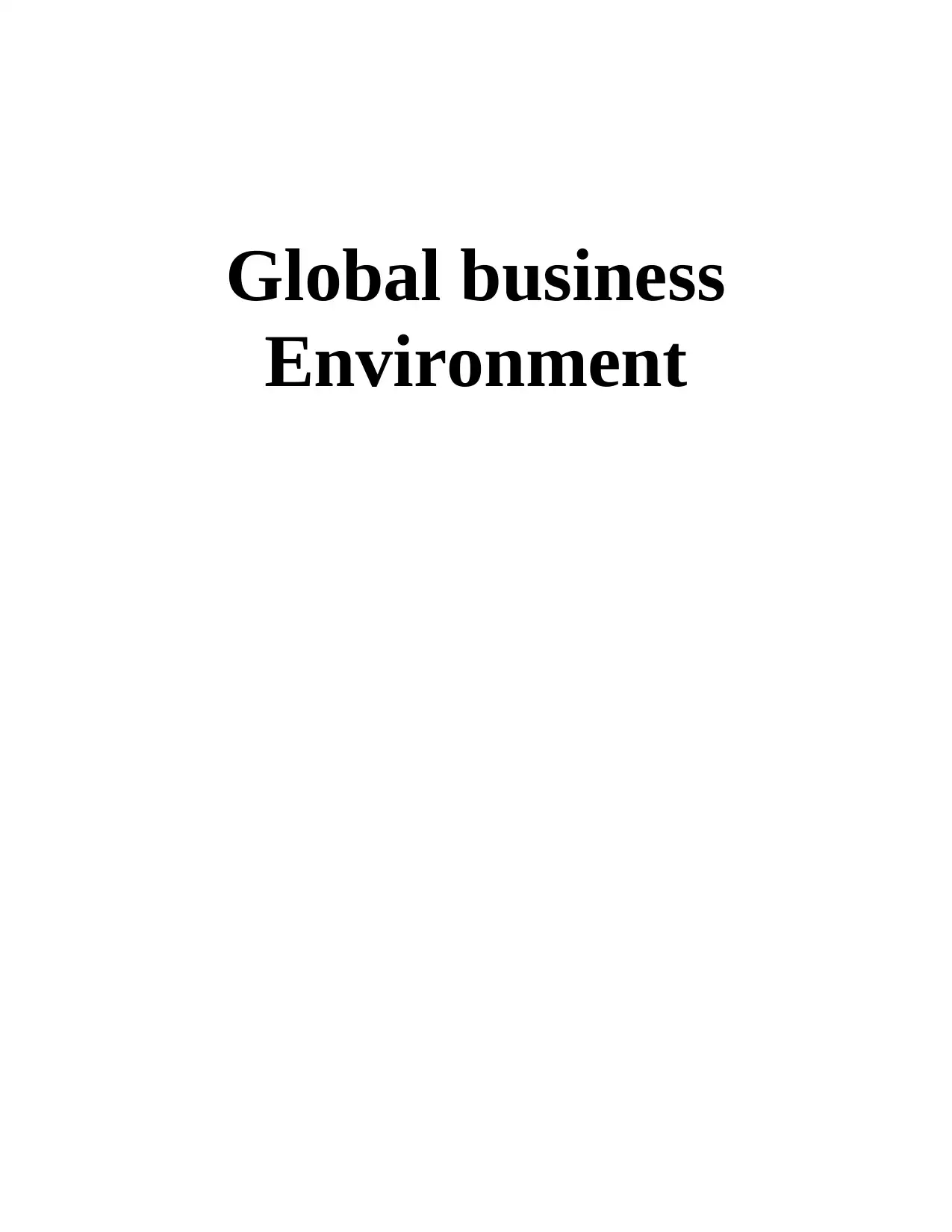
Global business
Environment
Environment
Paraphrase This Document
Need a fresh take? Get an instant paraphrase of this document with our AI Paraphraser
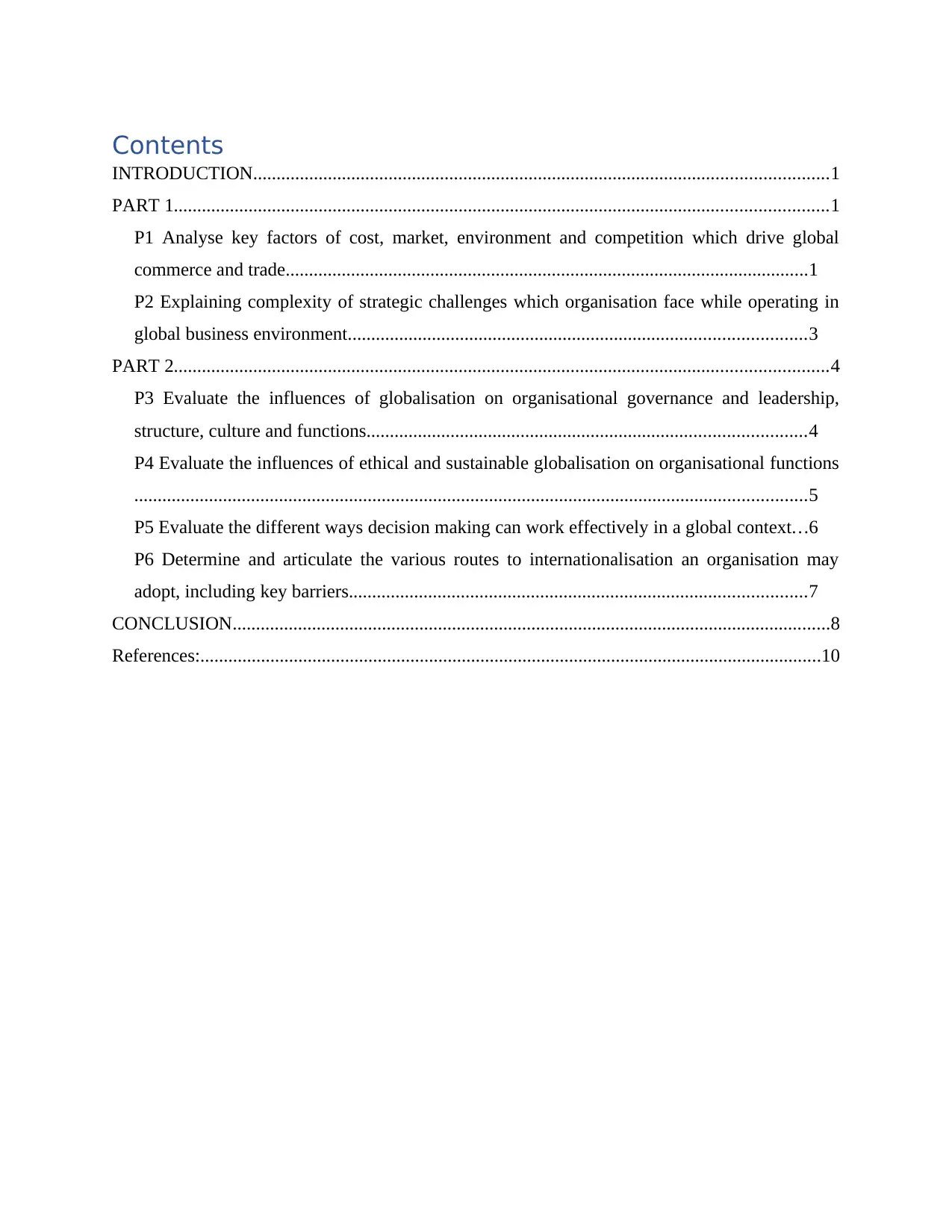
Contents
INTRODUCTION...........................................................................................................................1
PART 1............................................................................................................................................1
P1 Analyse key factors of cost, market, environment and competition which drive global
commerce and trade................................................................................................................1
P2 Explaining complexity of strategic challenges which organisation face while operating in
global business environment..................................................................................................3
PART 2............................................................................................................................................4
P3 Evaluate the influences of globalisation on organisational governance and leadership,
structure, culture and functions..............................................................................................4
P4 Evaluate the influences of ethical and sustainable globalisation on organisational functions
................................................................................................................................................5
P5 Evaluate the different ways decision making can work effectively in a global context...6
P6 Determine and articulate the various routes to internationalisation an organisation may
adopt, including key barriers..................................................................................................7
CONCLUSION................................................................................................................................8
References:.....................................................................................................................................10
INTRODUCTION...........................................................................................................................1
PART 1............................................................................................................................................1
P1 Analyse key factors of cost, market, environment and competition which drive global
commerce and trade................................................................................................................1
P2 Explaining complexity of strategic challenges which organisation face while operating in
global business environment..................................................................................................3
PART 2............................................................................................................................................4
P3 Evaluate the influences of globalisation on organisational governance and leadership,
structure, culture and functions..............................................................................................4
P4 Evaluate the influences of ethical and sustainable globalisation on organisational functions
................................................................................................................................................5
P5 Evaluate the different ways decision making can work effectively in a global context...6
P6 Determine and articulate the various routes to internationalisation an organisation may
adopt, including key barriers..................................................................................................7
CONCLUSION................................................................................................................................8
References:.....................................................................................................................................10
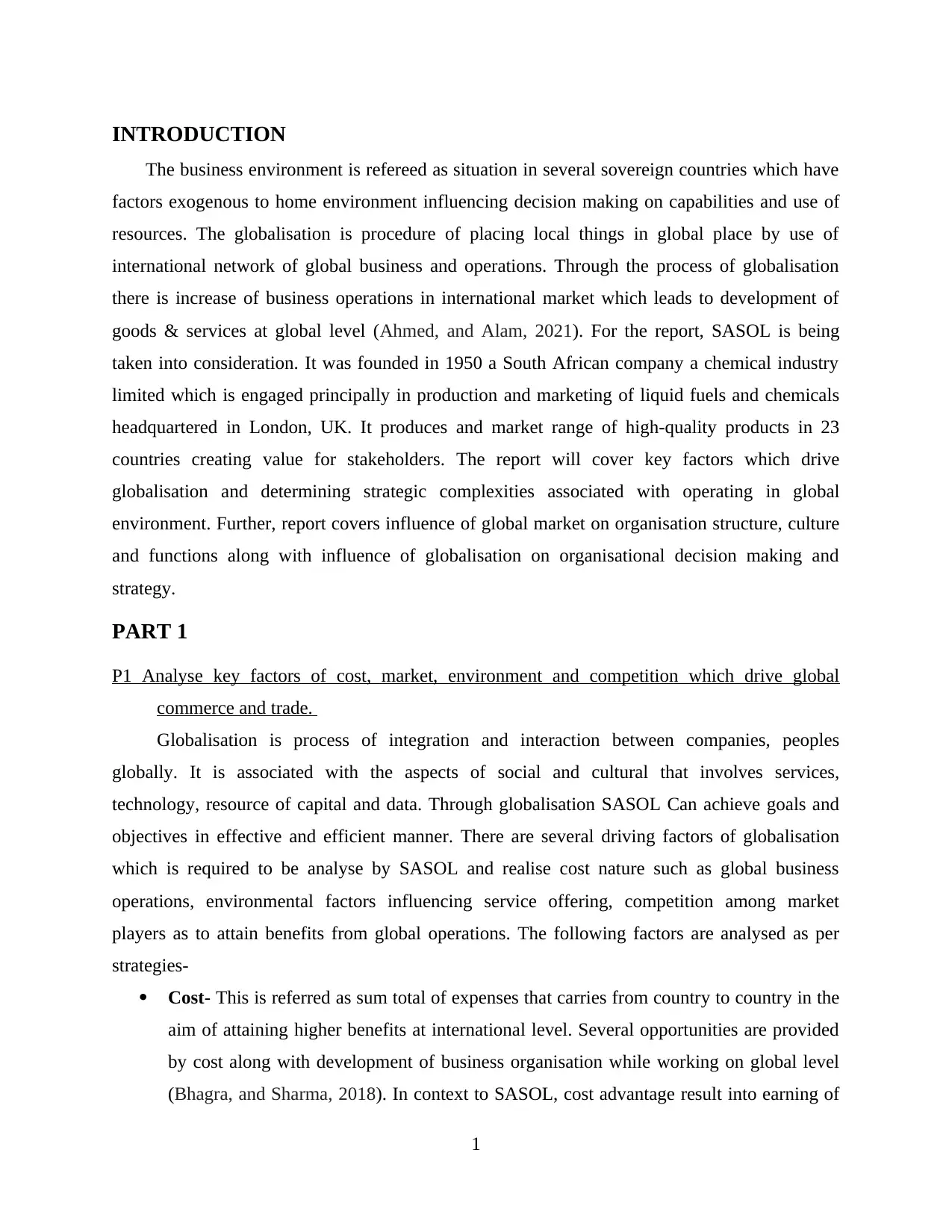
INTRODUCTION
The business environment is refereed as situation in several sovereign countries which have
factors exogenous to home environment influencing decision making on capabilities and use of
resources. The globalisation is procedure of placing local things in global place by use of
international network of global business and operations. Through the process of globalisation
there is increase of business operations in international market which leads to development of
goods & services at global level (Ahmed, and Alam, 2021). For the report, SASOL is being
taken into consideration. It was founded in 1950 a South African company a chemical industry
limited which is engaged principally in production and marketing of liquid fuels and chemicals
headquartered in London, UK. It produces and market range of high-quality products in 23
countries creating value for stakeholders. The report will cover key factors which drive
globalisation and determining strategic complexities associated with operating in global
environment. Further, report covers influence of global market on organisation structure, culture
and functions along with influence of globalisation on organisational decision making and
strategy.
PART 1
P1 Analyse key factors of cost, market, environment and competition which drive global
commerce and trade.
Globalisation is process of integration and interaction between companies, peoples
globally. It is associated with the aspects of social and cultural that involves services,
technology, resource of capital and data. Through globalisation SASOL Can achieve goals and
objectives in effective and efficient manner. There are several driving factors of globalisation
which is required to be analyse by SASOL and realise cost nature such as global business
operations, environmental factors influencing service offering, competition among market
players as to attain benefits from global operations. The following factors are analysed as per
strategies-
Cost- This is referred as sum total of expenses that carries from country to country in the
aim of attaining higher benefits at international level. Several opportunities are provided
by cost along with development of business organisation while working on global level
(Bhagra, and Sharma, 2018). In context to SASOL, cost advantage result into earning of
1
The business environment is refereed as situation in several sovereign countries which have
factors exogenous to home environment influencing decision making on capabilities and use of
resources. The globalisation is procedure of placing local things in global place by use of
international network of global business and operations. Through the process of globalisation
there is increase of business operations in international market which leads to development of
goods & services at global level (Ahmed, and Alam, 2021). For the report, SASOL is being
taken into consideration. It was founded in 1950 a South African company a chemical industry
limited which is engaged principally in production and marketing of liquid fuels and chemicals
headquartered in London, UK. It produces and market range of high-quality products in 23
countries creating value for stakeholders. The report will cover key factors which drive
globalisation and determining strategic complexities associated with operating in global
environment. Further, report covers influence of global market on organisation structure, culture
and functions along with influence of globalisation on organisational decision making and
strategy.
PART 1
P1 Analyse key factors of cost, market, environment and competition which drive global
commerce and trade.
Globalisation is process of integration and interaction between companies, peoples
globally. It is associated with the aspects of social and cultural that involves services,
technology, resource of capital and data. Through globalisation SASOL Can achieve goals and
objectives in effective and efficient manner. There are several driving factors of globalisation
which is required to be analyse by SASOL and realise cost nature such as global business
operations, environmental factors influencing service offering, competition among market
players as to attain benefits from global operations. The following factors are analysed as per
strategies-
Cost- This is referred as sum total of expenses that carries from country to country in the
aim of attaining higher benefits at international level. Several opportunities are provided
by cost along with development of business organisation while working on global level
(Bhagra, and Sharma, 2018). In context to SASOL, cost advantage result into earning of
1
⊘ This is a preview!⊘
Do you want full access?
Subscribe today to unlock all pages.

Trusted by 1+ million students worldwide
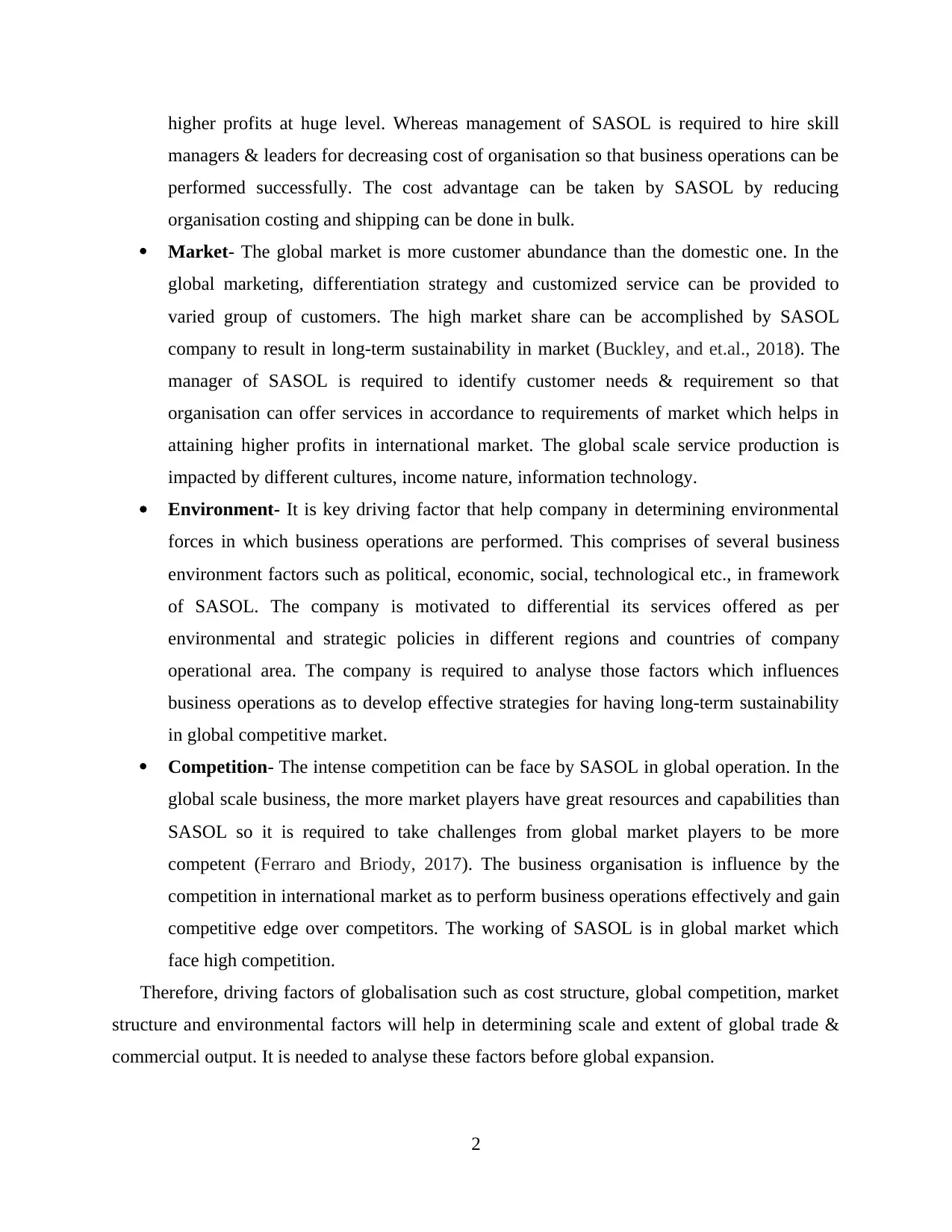
higher profits at huge level. Whereas management of SASOL is required to hire skill
managers & leaders for decreasing cost of organisation so that business operations can be
performed successfully. The cost advantage can be taken by SASOL by reducing
organisation costing and shipping can be done in bulk.
Market- The global market is more customer abundance than the domestic one. In the
global marketing, differentiation strategy and customized service can be provided to
varied group of customers. The high market share can be accomplished by SASOL
company to result in long-term sustainability in market (Buckley, and et.al., 2018). The
manager of SASOL is required to identify customer needs & requirement so that
organisation can offer services in accordance to requirements of market which helps in
attaining higher profits in international market. The global scale service production is
impacted by different cultures, income nature, information technology.
Environment- It is key driving factor that help company in determining environmental
forces in which business operations are performed. This comprises of several business
environment factors such as political, economic, social, technological etc., in framework
of SASOL. The company is motivated to differential its services offered as per
environmental and strategic policies in different regions and countries of company
operational area. The company is required to analyse those factors which influences
business operations as to develop effective strategies for having long-term sustainability
in global competitive market.
Competition- The intense competition can be face by SASOL in global operation. In the
global scale business, the more market players have great resources and capabilities than
SASOL so it is required to take challenges from global market players to be more
competent (Ferraro and Briody, 2017). The business organisation is influence by the
competition in international market as to perform business operations effectively and gain
competitive edge over competitors. The working of SASOL is in global market which
face high competition.
Therefore, driving factors of globalisation such as cost structure, global competition, market
structure and environmental factors will help in determining scale and extent of global trade &
commercial output. It is needed to analyse these factors before global expansion.
2
managers & leaders for decreasing cost of organisation so that business operations can be
performed successfully. The cost advantage can be taken by SASOL by reducing
organisation costing and shipping can be done in bulk.
Market- The global market is more customer abundance than the domestic one. In the
global marketing, differentiation strategy and customized service can be provided to
varied group of customers. The high market share can be accomplished by SASOL
company to result in long-term sustainability in market (Buckley, and et.al., 2018). The
manager of SASOL is required to identify customer needs & requirement so that
organisation can offer services in accordance to requirements of market which helps in
attaining higher profits in international market. The global scale service production is
impacted by different cultures, income nature, information technology.
Environment- It is key driving factor that help company in determining environmental
forces in which business operations are performed. This comprises of several business
environment factors such as political, economic, social, technological etc., in framework
of SASOL. The company is motivated to differential its services offered as per
environmental and strategic policies in different regions and countries of company
operational area. The company is required to analyse those factors which influences
business operations as to develop effective strategies for having long-term sustainability
in global competitive market.
Competition- The intense competition can be face by SASOL in global operation. In the
global scale business, the more market players have great resources and capabilities than
SASOL so it is required to take challenges from global market players to be more
competent (Ferraro and Briody, 2017). The business organisation is influence by the
competition in international market as to perform business operations effectively and gain
competitive edge over competitors. The working of SASOL is in global market which
face high competition.
Therefore, driving factors of globalisation such as cost structure, global competition, market
structure and environmental factors will help in determining scale and extent of global trade &
commercial output. It is needed to analyse these factors before global expansion.
2
Paraphrase This Document
Need a fresh take? Get an instant paraphrase of this document with our AI Paraphraser
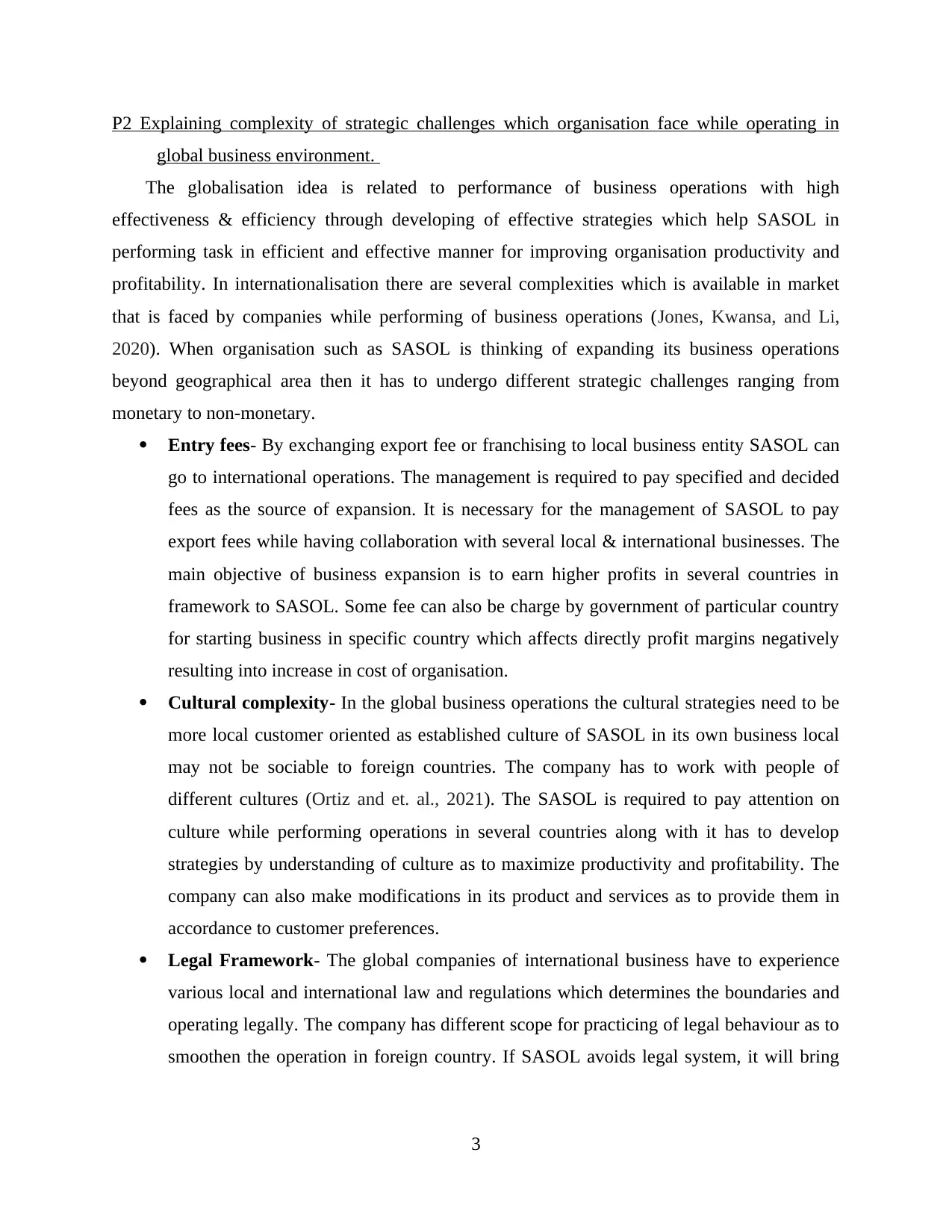
P2 Explaining complexity of strategic challenges which organisation face while operating in
global business environment.
The globalisation idea is related to performance of business operations with high
effectiveness & efficiency through developing of effective strategies which help SASOL in
performing task in efficient and effective manner for improving organisation productivity and
profitability. In internationalisation there are several complexities which is available in market
that is faced by companies while performing of business operations (Jones, Kwansa, and Li,
2020). When organisation such as SASOL is thinking of expanding its business operations
beyond geographical area then it has to undergo different strategic challenges ranging from
monetary to non-monetary.
Entry fees- By exchanging export fee or franchising to local business entity SASOL can
go to international operations. The management is required to pay specified and decided
fees as the source of expansion. It is necessary for the management of SASOL to pay
export fees while having collaboration with several local & international businesses. The
main objective of business expansion is to earn higher profits in several countries in
framework to SASOL. Some fee can also be charge by government of particular country
for starting business in specific country which affects directly profit margins negatively
resulting into increase in cost of organisation.
Cultural complexity- In the global business operations the cultural strategies need to be
more local customer oriented as established culture of SASOL in its own business local
may not be sociable to foreign countries. The company has to work with people of
different cultures (Ortiz and et. al., 2021). The SASOL is required to pay attention on
culture while performing operations in several countries along with it has to develop
strategies by understanding of culture as to maximize productivity and profitability. The
company can also make modifications in its product and services as to provide them in
accordance to customer preferences.
Legal Framework- The global companies of international business have to experience
various local and international law and regulations which determines the boundaries and
operating legally. The company has different scope for practicing of legal behaviour as to
smoothen the operation in foreign country. If SASOL avoids legal system, it will bring
3
global business environment.
The globalisation idea is related to performance of business operations with high
effectiveness & efficiency through developing of effective strategies which help SASOL in
performing task in efficient and effective manner for improving organisation productivity and
profitability. In internationalisation there are several complexities which is available in market
that is faced by companies while performing of business operations (Jones, Kwansa, and Li,
2020). When organisation such as SASOL is thinking of expanding its business operations
beyond geographical area then it has to undergo different strategic challenges ranging from
monetary to non-monetary.
Entry fees- By exchanging export fee or franchising to local business entity SASOL can
go to international operations. The management is required to pay specified and decided
fees as the source of expansion. It is necessary for the management of SASOL to pay
export fees while having collaboration with several local & international businesses. The
main objective of business expansion is to earn higher profits in several countries in
framework to SASOL. Some fee can also be charge by government of particular country
for starting business in specific country which affects directly profit margins negatively
resulting into increase in cost of organisation.
Cultural complexity- In the global business operations the cultural strategies need to be
more local customer oriented as established culture of SASOL in its own business local
may not be sociable to foreign countries. The company has to work with people of
different cultures (Ortiz and et. al., 2021). The SASOL is required to pay attention on
culture while performing operations in several countries along with it has to develop
strategies by understanding of culture as to maximize productivity and profitability. The
company can also make modifications in its product and services as to provide them in
accordance to customer preferences.
Legal Framework- The global companies of international business have to experience
various local and international law and regulations which determines the boundaries and
operating legally. The company has different scope for practicing of legal behaviour as to
smoothen the operation in foreign country. If SASOL avoids legal system, it will bring
3
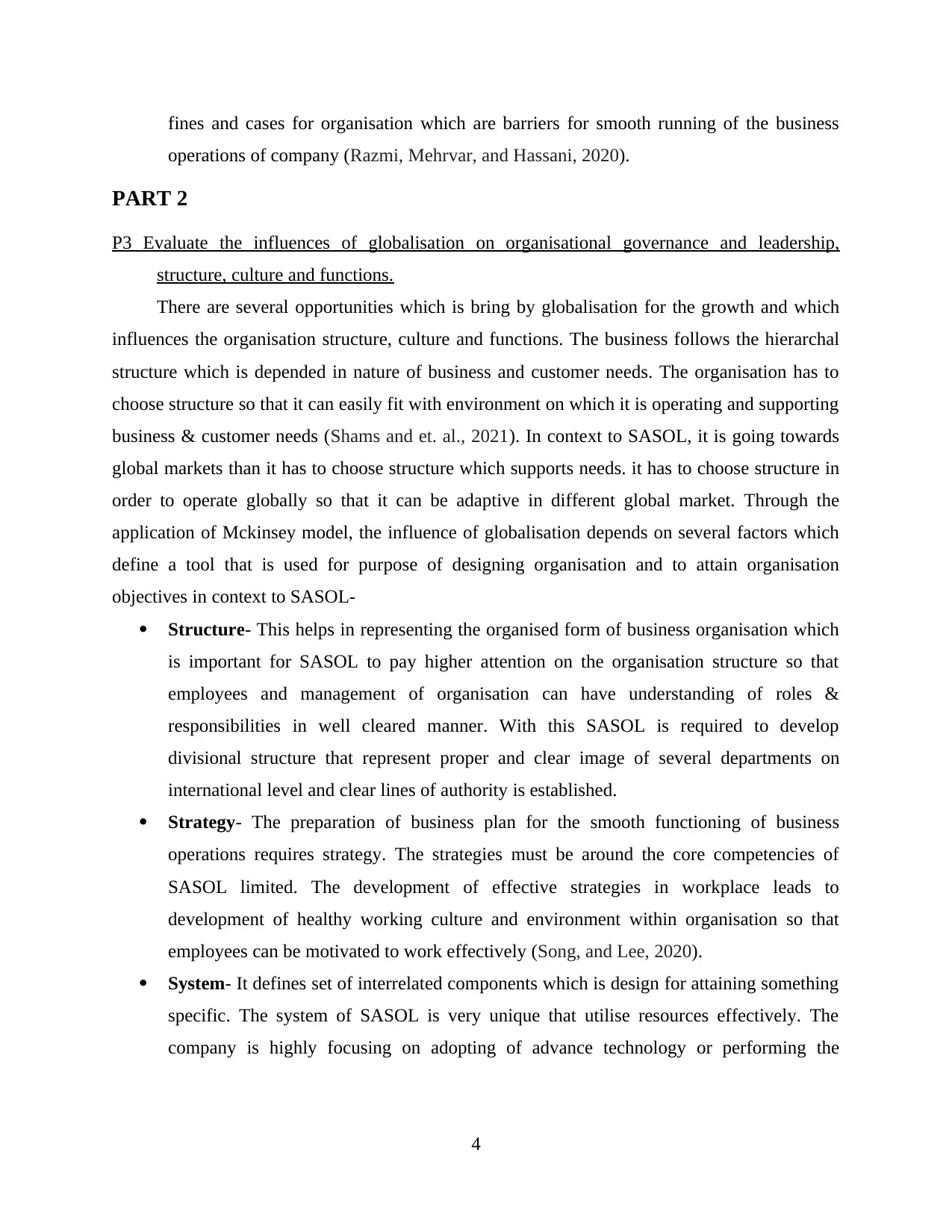
fines and cases for organisation which are barriers for smooth running of the business
operations of company (Razmi, Mehrvar, and Hassani, 2020).
PART 2
P3 Evaluate the influences of globalisation on organisational governance and leadership,
structure, culture and functions.
There are several opportunities which is bring by globalisation for the growth and which
influences the organisation structure, culture and functions. The business follows the hierarchal
structure which is depended in nature of business and customer needs. The organisation has to
choose structure so that it can easily fit with environment on which it is operating and supporting
business & customer needs (Shams and et. al., 2021). In context to SASOL, it is going towards
global markets than it has to choose structure which supports needs. it has to choose structure in
order to operate globally so that it can be adaptive in different global market. Through the
application of Mckinsey model, the influence of globalisation depends on several factors which
define a tool that is used for purpose of designing organisation and to attain organisation
objectives in context to SASOL-
Structure- This helps in representing the organised form of business organisation which
is important for SASOL to pay higher attention on the organisation structure so that
employees and management of organisation can have understanding of roles &
responsibilities in well cleared manner. With this SASOL is required to develop
divisional structure that represent proper and clear image of several departments on
international level and clear lines of authority is established.
Strategy- The preparation of business plan for the smooth functioning of business
operations requires strategy. The strategies must be around the core competencies of
SASOL limited. The development of effective strategies in workplace leads to
development of healthy working culture and environment within organisation so that
employees can be motivated to work effectively (Song, and Lee, 2020).
System- It defines set of interrelated components which is design for attaining something
specific. The system of SASOL is very unique that utilise resources effectively. The
company is highly focusing on adopting of advance technology or performing the
4
operations of company (Razmi, Mehrvar, and Hassani, 2020).
PART 2
P3 Evaluate the influences of globalisation on organisational governance and leadership,
structure, culture and functions.
There are several opportunities which is bring by globalisation for the growth and which
influences the organisation structure, culture and functions. The business follows the hierarchal
structure which is depended in nature of business and customer needs. The organisation has to
choose structure so that it can easily fit with environment on which it is operating and supporting
business & customer needs (Shams and et. al., 2021). In context to SASOL, it is going towards
global markets than it has to choose structure which supports needs. it has to choose structure in
order to operate globally so that it can be adaptive in different global market. Through the
application of Mckinsey model, the influence of globalisation depends on several factors which
define a tool that is used for purpose of designing organisation and to attain organisation
objectives in context to SASOL-
Structure- This helps in representing the organised form of business organisation which
is important for SASOL to pay higher attention on the organisation structure so that
employees and management of organisation can have understanding of roles &
responsibilities in well cleared manner. With this SASOL is required to develop
divisional structure that represent proper and clear image of several departments on
international level and clear lines of authority is established.
Strategy- The preparation of business plan for the smooth functioning of business
operations requires strategy. The strategies must be around the core competencies of
SASOL limited. The development of effective strategies in workplace leads to
development of healthy working culture and environment within organisation so that
employees can be motivated to work effectively (Song, and Lee, 2020).
System- It defines set of interrelated components which is design for attaining something
specific. The system of SASOL is very unique that utilise resources effectively. The
company is highly focusing on adopting of advance technology or performing the
4
⊘ This is a preview!⊘
Do you want full access?
Subscribe today to unlock all pages.

Trusted by 1+ million students worldwide
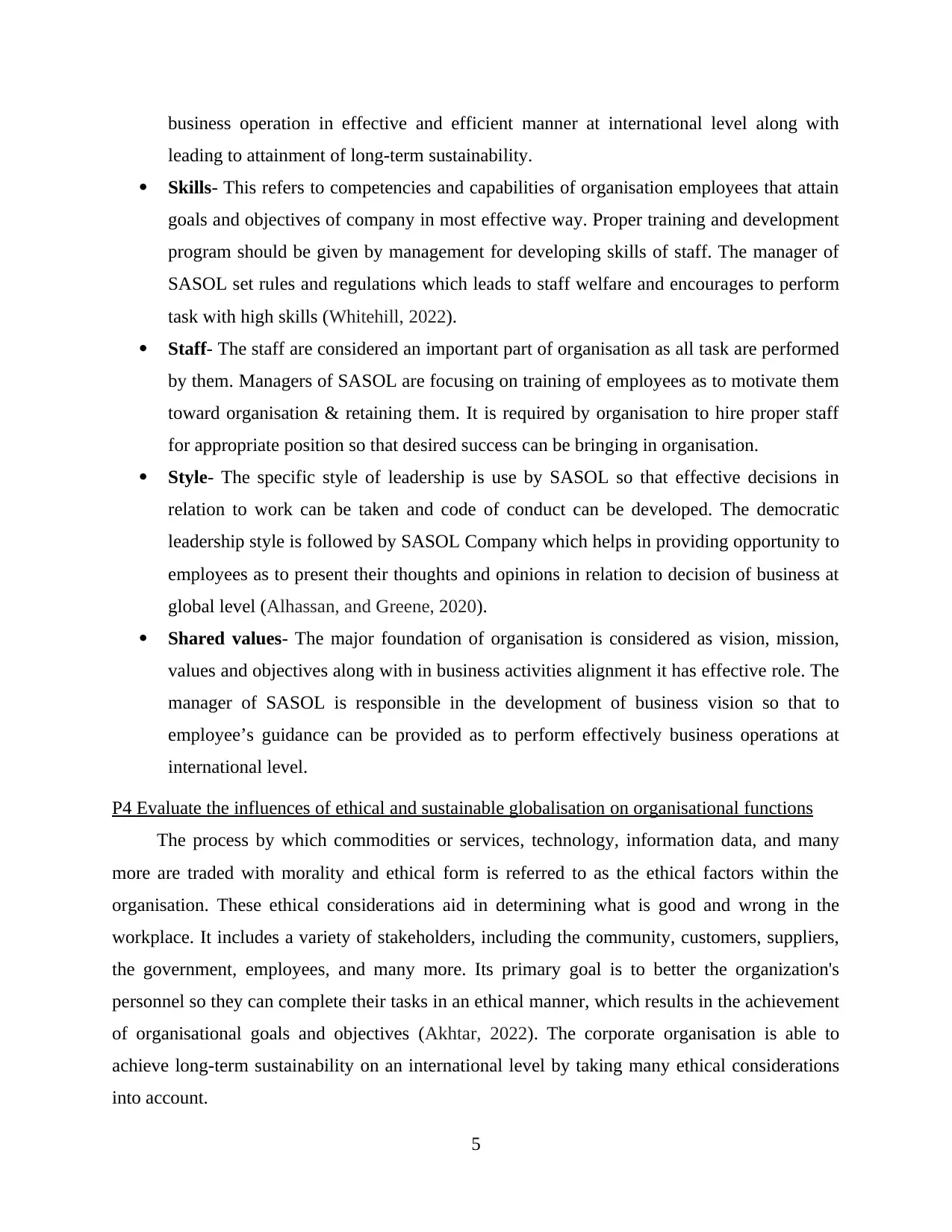
business operation in effective and efficient manner at international level along with
leading to attainment of long-term sustainability.
Skills- This refers to competencies and capabilities of organisation employees that attain
goals and objectives of company in most effective way. Proper training and development
program should be given by management for developing skills of staff. The manager of
SASOL set rules and regulations which leads to staff welfare and encourages to perform
task with high skills (Whitehill, 2022).
Staff- The staff are considered an important part of organisation as all task are performed
by them. Managers of SASOL are focusing on training of employees as to motivate them
toward organisation & retaining them. It is required by organisation to hire proper staff
for appropriate position so that desired success can be bringing in organisation.
Style- The specific style of leadership is use by SASOL so that effective decisions in
relation to work can be taken and code of conduct can be developed. The democratic
leadership style is followed by SASOL Company which helps in providing opportunity to
employees as to present their thoughts and opinions in relation to decision of business at
global level (Alhassan, and Greene, 2020).
Shared values- The major foundation of organisation is considered as vision, mission,
values and objectives along with in business activities alignment it has effective role. The
manager of SASOL is responsible in the development of business vision so that to
employee’s guidance can be provided as to perform effectively business operations at
international level.
P4 Evaluate the influences of ethical and sustainable globalisation on organisational functions
The process by which commodities or services, technology, information data, and many
more are traded with morality and ethical form is referred to as the ethical factors within the
organisation. These ethical considerations aid in determining what is good and wrong in the
workplace. It includes a variety of stakeholders, including the community, customers, suppliers,
the government, employees, and many more. Its primary goal is to better the organization's
personnel so they can complete their tasks in an ethical manner, which results in the achievement
of organisational goals and objectives (Akhtar, 2022). The corporate organisation is able to
achieve long-term sustainability on an international level by taking many ethical considerations
into account.
5
leading to attainment of long-term sustainability.
Skills- This refers to competencies and capabilities of organisation employees that attain
goals and objectives of company in most effective way. Proper training and development
program should be given by management for developing skills of staff. The manager of
SASOL set rules and regulations which leads to staff welfare and encourages to perform
task with high skills (Whitehill, 2022).
Staff- The staff are considered an important part of organisation as all task are performed
by them. Managers of SASOL are focusing on training of employees as to motivate them
toward organisation & retaining them. It is required by organisation to hire proper staff
for appropriate position so that desired success can be bringing in organisation.
Style- The specific style of leadership is use by SASOL so that effective decisions in
relation to work can be taken and code of conduct can be developed. The democratic
leadership style is followed by SASOL Company which helps in providing opportunity to
employees as to present their thoughts and opinions in relation to decision of business at
global level (Alhassan, and Greene, 2020).
Shared values- The major foundation of organisation is considered as vision, mission,
values and objectives along with in business activities alignment it has effective role. The
manager of SASOL is responsible in the development of business vision so that to
employee’s guidance can be provided as to perform effectively business operations at
international level.
P4 Evaluate the influences of ethical and sustainable globalisation on organisational functions
The process by which commodities or services, technology, information data, and many
more are traded with morality and ethical form is referred to as the ethical factors within the
organisation. These ethical considerations aid in determining what is good and wrong in the
workplace. It includes a variety of stakeholders, including the community, customers, suppliers,
the government, employees, and many more. Its primary goal is to better the organization's
personnel so they can complete their tasks in an ethical manner, which results in the achievement
of organisational goals and objectives (Akhtar, 2022). The corporate organisation is able to
achieve long-term sustainability on an international level by taking many ethical considerations
into account.
5
Paraphrase This Document
Need a fresh take? Get an instant paraphrase of this document with our AI Paraphraser
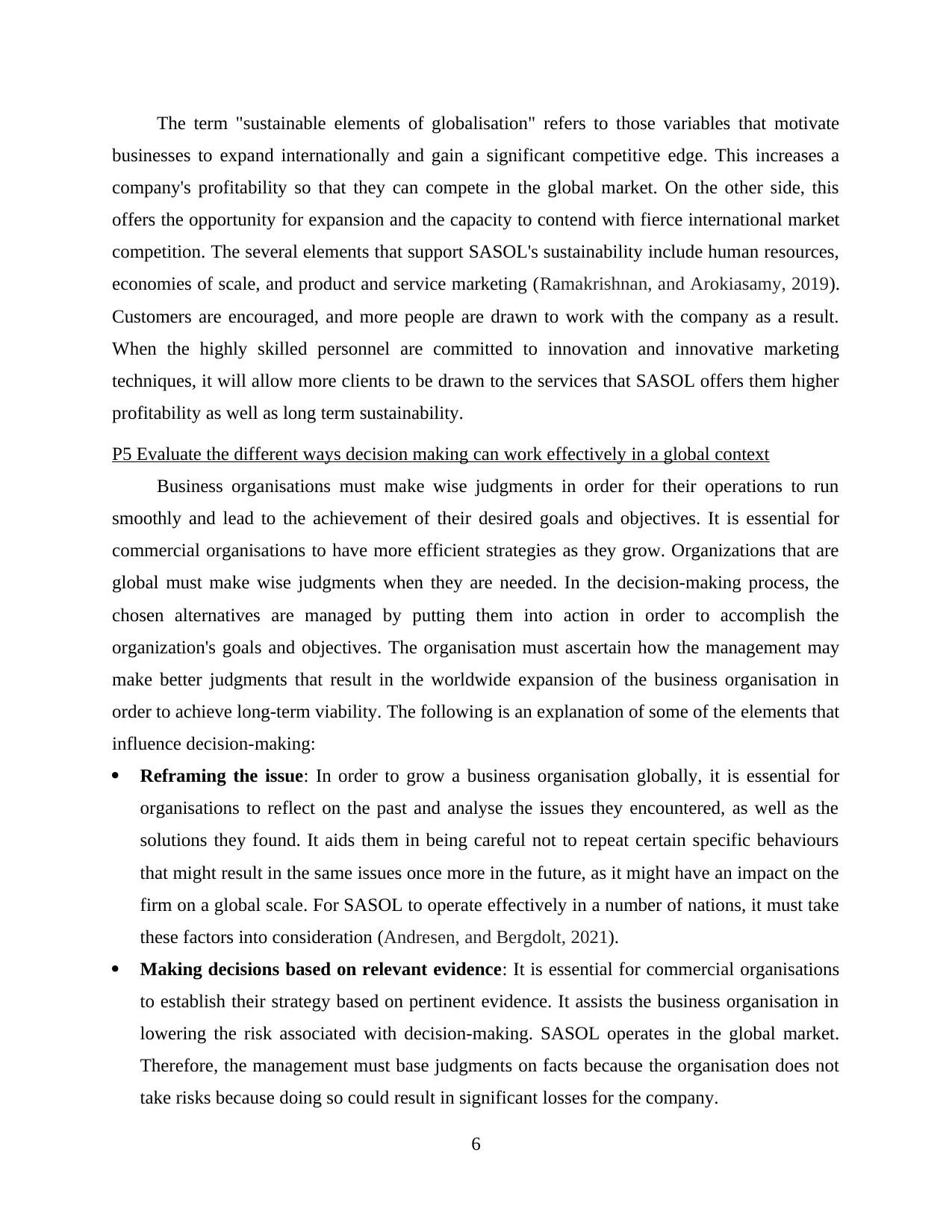
The term "sustainable elements of globalisation" refers to those variables that motivate
businesses to expand internationally and gain a significant competitive edge. This increases a
company's profitability so that they can compete in the global market. On the other side, this
offers the opportunity for expansion and the capacity to contend with fierce international market
competition. The several elements that support SASOL's sustainability include human resources,
economies of scale, and product and service marketing (Ramakrishnan, and Arokiasamy, 2019).
Customers are encouraged, and more people are drawn to work with the company as a result.
When the highly skilled personnel are committed to innovation and innovative marketing
techniques, it will allow more clients to be drawn to the services that SASOL offers them higher
profitability as well as long term sustainability.
P5 Evaluate the different ways decision making can work effectively in a global context
Business organisations must make wise judgments in order for their operations to run
smoothly and lead to the achievement of their desired goals and objectives. It is essential for
commercial organisations to have more efficient strategies as they grow. Organizations that are
global must make wise judgments when they are needed. In the decision-making process, the
chosen alternatives are managed by putting them into action in order to accomplish the
organization's goals and objectives. The organisation must ascertain how the management may
make better judgments that result in the worldwide expansion of the business organisation in
order to achieve long-term viability. The following is an explanation of some of the elements that
influence decision-making:
Reframing the issue: In order to grow a business organisation globally, it is essential for
organisations to reflect on the past and analyse the issues they encountered, as well as the
solutions they found. It aids them in being careful not to repeat certain specific behaviours
that might result in the same issues once more in the future, as it might have an impact on the
firm on a global scale. For SASOL to operate effectively in a number of nations, it must take
these factors into consideration (Andresen, and Bergdolt, 2021).
Making decisions based on relevant evidence: It is essential for commercial organisations
to establish their strategy based on pertinent evidence. It assists the business organisation in
lowering the risk associated with decision-making. SASOL operates in the global market.
Therefore, the management must base judgments on facts because the organisation does not
take risks because doing so could result in significant losses for the company.
6
businesses to expand internationally and gain a significant competitive edge. This increases a
company's profitability so that they can compete in the global market. On the other side, this
offers the opportunity for expansion and the capacity to contend with fierce international market
competition. The several elements that support SASOL's sustainability include human resources,
economies of scale, and product and service marketing (Ramakrishnan, and Arokiasamy, 2019).
Customers are encouraged, and more people are drawn to work with the company as a result.
When the highly skilled personnel are committed to innovation and innovative marketing
techniques, it will allow more clients to be drawn to the services that SASOL offers them higher
profitability as well as long term sustainability.
P5 Evaluate the different ways decision making can work effectively in a global context
Business organisations must make wise judgments in order for their operations to run
smoothly and lead to the achievement of their desired goals and objectives. It is essential for
commercial organisations to have more efficient strategies as they grow. Organizations that are
global must make wise judgments when they are needed. In the decision-making process, the
chosen alternatives are managed by putting them into action in order to accomplish the
organization's goals and objectives. The organisation must ascertain how the management may
make better judgments that result in the worldwide expansion of the business organisation in
order to achieve long-term viability. The following is an explanation of some of the elements that
influence decision-making:
Reframing the issue: In order to grow a business organisation globally, it is essential for
organisations to reflect on the past and analyse the issues they encountered, as well as the
solutions they found. It aids them in being careful not to repeat certain specific behaviours
that might result in the same issues once more in the future, as it might have an impact on the
firm on a global scale. For SASOL to operate effectively in a number of nations, it must take
these factors into consideration (Andresen, and Bergdolt, 2021).
Making decisions based on relevant evidence: It is essential for commercial organisations
to establish their strategy based on pertinent evidence. It assists the business organisation in
lowering the risk associated with decision-making. SASOL operates in the global market.
Therefore, the management must base judgments on facts because the organisation does not
take risks because doing so could result in significant losses for the company.
6
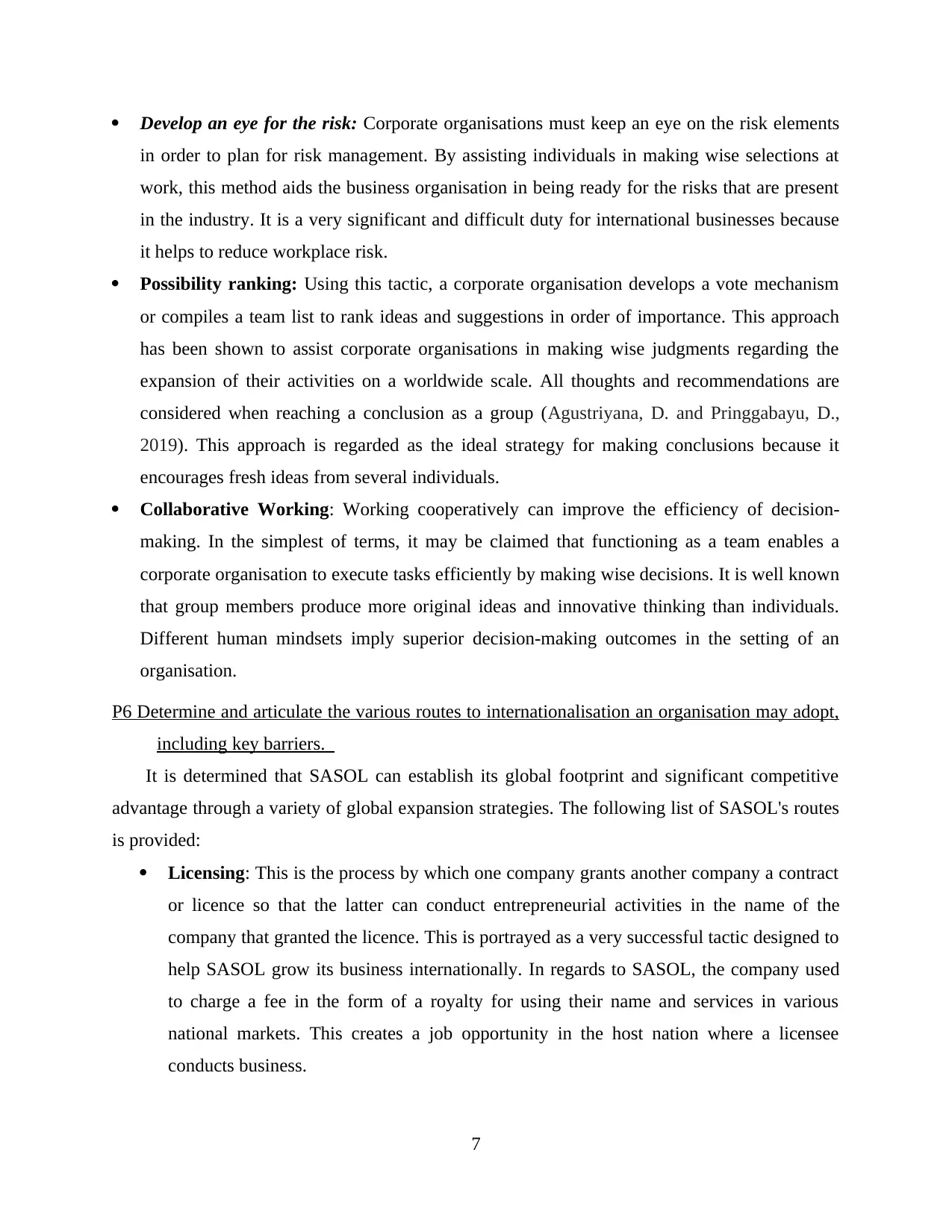
Develop an eye for the risk: Corporate organisations must keep an eye on the risk elements
in order to plan for risk management. By assisting individuals in making wise selections at
work, this method aids the business organisation in being ready for the risks that are present
in the industry. It is a very significant and difficult duty for international businesses because
it helps to reduce workplace risk.
Possibility ranking: Using this tactic, a corporate organisation develops a vote mechanism
or compiles a team list to rank ideas and suggestions in order of importance. This approach
has been shown to assist corporate organisations in making wise judgments regarding the
expansion of their activities on a worldwide scale. All thoughts and recommendations are
considered when reaching a conclusion as a group (Agustriyana, D. and Pringgabayu, D.,
2019). This approach is regarded as the ideal strategy for making conclusions because it
encourages fresh ideas from several individuals.
Collaborative Working: Working cooperatively can improve the efficiency of decision-
making. In the simplest of terms, it may be claimed that functioning as a team enables a
corporate organisation to execute tasks efficiently by making wise decisions. It is well known
that group members produce more original ideas and innovative thinking than individuals.
Different human mindsets imply superior decision-making outcomes in the setting of an
organisation.
P6 Determine and articulate the various routes to internationalisation an organisation may adopt,
including key barriers.
It is determined that SASOL can establish its global footprint and significant competitive
advantage through a variety of global expansion strategies. The following list of SASOL's routes
is provided:
Licensing: This is the process by which one company grants another company a contract
or licence so that the latter can conduct entrepreneurial activities in the name of the
company that granted the licence. This is portrayed as a very successful tactic designed to
help SASOL grow its business internationally. In regards to SASOL, the company used
to charge a fee in the form of a royalty for using their name and services in various
national markets. This creates a job opportunity in the host nation where a licensee
conducts business.
7
in order to plan for risk management. By assisting individuals in making wise selections at
work, this method aids the business organisation in being ready for the risks that are present
in the industry. It is a very significant and difficult duty for international businesses because
it helps to reduce workplace risk.
Possibility ranking: Using this tactic, a corporate organisation develops a vote mechanism
or compiles a team list to rank ideas and suggestions in order of importance. This approach
has been shown to assist corporate organisations in making wise judgments regarding the
expansion of their activities on a worldwide scale. All thoughts and recommendations are
considered when reaching a conclusion as a group (Agustriyana, D. and Pringgabayu, D.,
2019). This approach is regarded as the ideal strategy for making conclusions because it
encourages fresh ideas from several individuals.
Collaborative Working: Working cooperatively can improve the efficiency of decision-
making. In the simplest of terms, it may be claimed that functioning as a team enables a
corporate organisation to execute tasks efficiently by making wise decisions. It is well known
that group members produce more original ideas and innovative thinking than individuals.
Different human mindsets imply superior decision-making outcomes in the setting of an
organisation.
P6 Determine and articulate the various routes to internationalisation an organisation may adopt,
including key barriers.
It is determined that SASOL can establish its global footprint and significant competitive
advantage through a variety of global expansion strategies. The following list of SASOL's routes
is provided:
Licensing: This is the process by which one company grants another company a contract
or licence so that the latter can conduct entrepreneurial activities in the name of the
company that granted the licence. This is portrayed as a very successful tactic designed to
help SASOL grow its business internationally. In regards to SASOL, the company used
to charge a fee in the form of a royalty for using their name and services in various
national markets. This creates a job opportunity in the host nation where a licensee
conducts business.
7
⊘ This is a preview!⊘
Do you want full access?
Subscribe today to unlock all pages.

Trusted by 1+ million students worldwide
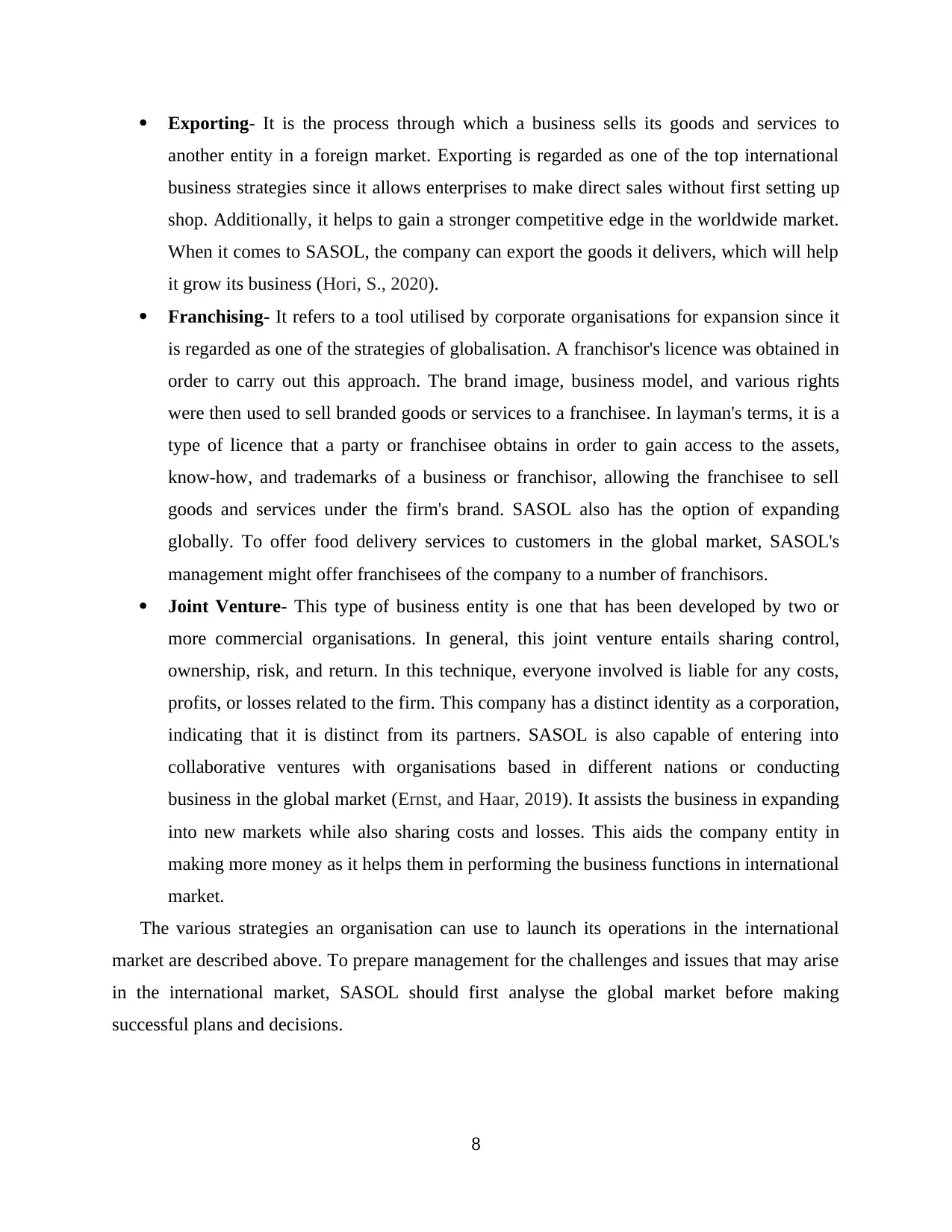
Exporting- It is the process through which a business sells its goods and services to
another entity in a foreign market. Exporting is regarded as one of the top international
business strategies since it allows enterprises to make direct sales without first setting up
shop. Additionally, it helps to gain a stronger competitive edge in the worldwide market.
When it comes to SASOL, the company can export the goods it delivers, which will help
it grow its business (Hori, S., 2020).
Franchising- It refers to a tool utilised by corporate organisations for expansion since it
is regarded as one of the strategies of globalisation. A franchisor's licence was obtained in
order to carry out this approach. The brand image, business model, and various rights
were then used to sell branded goods or services to a franchisee. In layman's terms, it is a
type of licence that a party or franchisee obtains in order to gain access to the assets,
know-how, and trademarks of a business or franchisor, allowing the franchisee to sell
goods and services under the firm's brand. SASOL also has the option of expanding
globally. To offer food delivery services to customers in the global market, SASOL's
management might offer franchisees of the company to a number of franchisors.
Joint Venture- This type of business entity is one that has been developed by two or
more commercial organisations. In general, this joint venture entails sharing control,
ownership, risk, and return. In this technique, everyone involved is liable for any costs,
profits, or losses related to the firm. This company has a distinct identity as a corporation,
indicating that it is distinct from its partners. SASOL is also capable of entering into
collaborative ventures with organisations based in different nations or conducting
business in the global market (Ernst, and Haar, 2019). It assists the business in expanding
into new markets while also sharing costs and losses. This aids the company entity in
making more money as it helps them in performing the business functions in international
market.
The various strategies an organisation can use to launch its operations in the international
market are described above. To prepare management for the challenges and issues that may arise
in the international market, SASOL should first analyse the global market before making
successful plans and decisions.
8
another entity in a foreign market. Exporting is regarded as one of the top international
business strategies since it allows enterprises to make direct sales without first setting up
shop. Additionally, it helps to gain a stronger competitive edge in the worldwide market.
When it comes to SASOL, the company can export the goods it delivers, which will help
it grow its business (Hori, S., 2020).
Franchising- It refers to a tool utilised by corporate organisations for expansion since it
is regarded as one of the strategies of globalisation. A franchisor's licence was obtained in
order to carry out this approach. The brand image, business model, and various rights
were then used to sell branded goods or services to a franchisee. In layman's terms, it is a
type of licence that a party or franchisee obtains in order to gain access to the assets,
know-how, and trademarks of a business or franchisor, allowing the franchisee to sell
goods and services under the firm's brand. SASOL also has the option of expanding
globally. To offer food delivery services to customers in the global market, SASOL's
management might offer franchisees of the company to a number of franchisors.
Joint Venture- This type of business entity is one that has been developed by two or
more commercial organisations. In general, this joint venture entails sharing control,
ownership, risk, and return. In this technique, everyone involved is liable for any costs,
profits, or losses related to the firm. This company has a distinct identity as a corporation,
indicating that it is distinct from its partners. SASOL is also capable of entering into
collaborative ventures with organisations based in different nations or conducting
business in the global market (Ernst, and Haar, 2019). It assists the business in expanding
into new markets while also sharing costs and losses. This aids the company entity in
making more money as it helps them in performing the business functions in international
market.
The various strategies an organisation can use to launch its operations in the international
market are described above. To prepare management for the challenges and issues that may arise
in the international market, SASOL should first analyse the global market before making
successful plans and decisions.
8
Paraphrase This Document
Need a fresh take? Get an instant paraphrase of this document with our AI Paraphraser
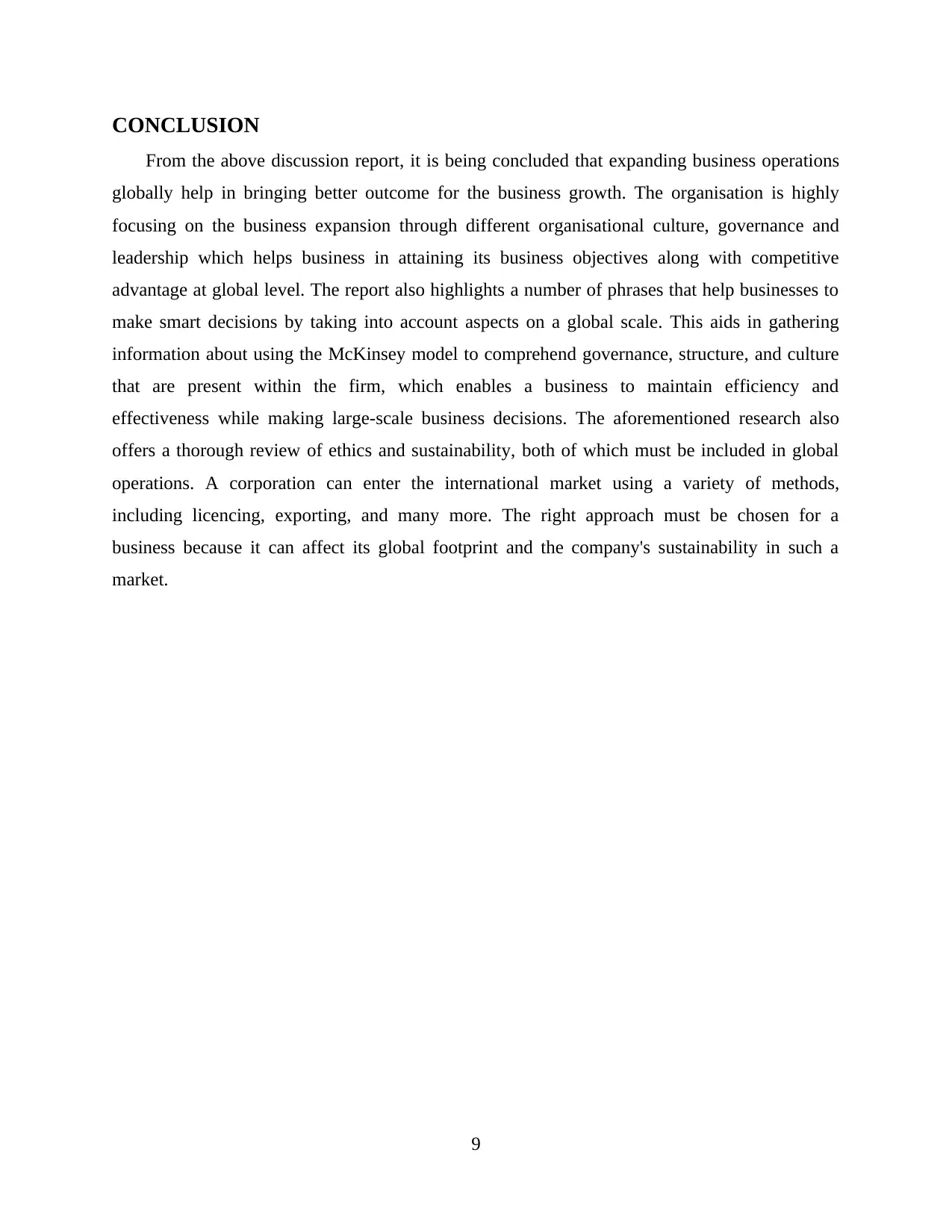
CONCLUSION
From the above discussion report, it is being concluded that expanding business operations
globally help in bringing better outcome for the business growth. The organisation is highly
focusing on the business expansion through different organisational culture, governance and
leadership which helps business in attaining its business objectives along with competitive
advantage at global level. The report also highlights a number of phrases that help businesses to
make smart decisions by taking into account aspects on a global scale. This aids in gathering
information about using the McKinsey model to comprehend governance, structure, and culture
that are present within the firm, which enables a business to maintain efficiency and
effectiveness while making large-scale business decisions. The aforementioned research also
offers a thorough review of ethics and sustainability, both of which must be included in global
operations. A corporation can enter the international market using a variety of methods,
including licencing, exporting, and many more. The right approach must be chosen for a
business because it can affect its global footprint and the company's sustainability in such a
market.
9
From the above discussion report, it is being concluded that expanding business operations
globally help in bringing better outcome for the business growth. The organisation is highly
focusing on the business expansion through different organisational culture, governance and
leadership which helps business in attaining its business objectives along with competitive
advantage at global level. The report also highlights a number of phrases that help businesses to
make smart decisions by taking into account aspects on a global scale. This aids in gathering
information about using the McKinsey model to comprehend governance, structure, and culture
that are present within the firm, which enables a business to maintain efficiency and
effectiveness while making large-scale business decisions. The aforementioned research also
offers a thorough review of ethics and sustainability, both of which must be included in global
operations. A corporation can enter the international market using a variety of methods,
including licencing, exporting, and many more. The right approach must be chosen for a
business because it can affect its global footprint and the company's sustainability in such a
market.
9
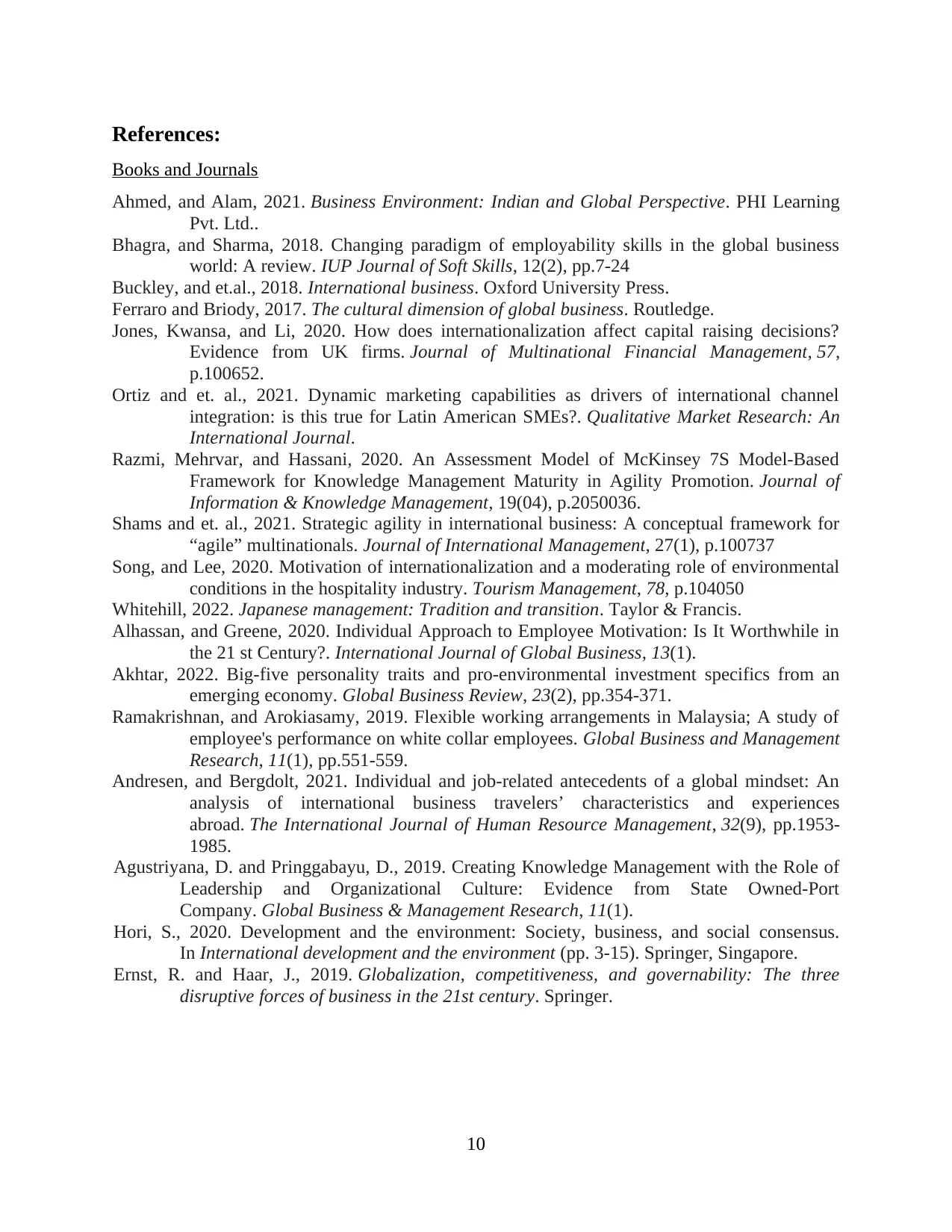
References:
Books and Journals
Ahmed, and Alam, 2021. Business Environment: Indian and Global Perspective. PHI Learning
Pvt. Ltd..
Bhagra, and Sharma, 2018. Changing paradigm of employability skills in the global business
world: A review. IUP Journal of Soft Skills, 12(2), pp.7-24
Buckley, and et.al., 2018. International business. Oxford University Press.
Ferraro and Briody, 2017. The cultural dimension of global business. Routledge.
Jones, Kwansa, and Li, 2020. How does internationalization affect capital raising decisions?
Evidence from UK firms. Journal of Multinational Financial Management, 57,
p.100652.
Ortiz and et. al., 2021. Dynamic marketing capabilities as drivers of international channel
integration: is this true for Latin American SMEs?. Qualitative Market Research: An
International Journal.
Razmi, Mehrvar, and Hassani, 2020. An Assessment Model of McKinsey 7S Model-Based
Framework for Knowledge Management Maturity in Agility Promotion. Journal of
Information & Knowledge Management, 19(04), p.2050036.
Shams and et. al., 2021. Strategic agility in international business: A conceptual framework for
“agile” multinationals. Journal of International Management, 27(1), p.100737
Song, and Lee, 2020. Motivation of internationalization and a moderating role of environmental
conditions in the hospitality industry. Tourism Management, 78, p.104050
Whitehill, 2022. Japanese management: Tradition and transition. Taylor & Francis.
Alhassan, and Greene, 2020. Individual Approach to Employee Motivation: Is It Worthwhile in
the 21 st Century?. International Journal of Global Business, 13(1).
Akhtar, 2022. Big-five personality traits and pro-environmental investment specifics from an
emerging economy. Global Business Review, 23(2), pp.354-371.
Ramakrishnan, and Arokiasamy, 2019. Flexible working arrangements in Malaysia; A study of
employee's performance on white collar employees. Global Business and Management
Research, 11(1), pp.551-559.
Andresen, and Bergdolt, 2021. Individual and job-related antecedents of a global mindset: An
analysis of international business travelers’ characteristics and experiences
abroad. The International Journal of Human Resource Management, 32(9), pp.1953-
1985.
Agustriyana, D. and Pringgabayu, D., 2019. Creating Knowledge Management with the Role of
Leadership and Organizational Culture: Evidence from State Owned-Port
Company. Global Business & Management Research, 11(1).
Hori, S., 2020. Development and the environment: Society, business, and social consensus.
In International development and the environment (pp. 3-15). Springer, Singapore.
Ernst, R. and Haar, J., 2019. Globalization, competitiveness, and governability: The three
disruptive forces of business in the 21st century. Springer.
10
Books and Journals
Ahmed, and Alam, 2021. Business Environment: Indian and Global Perspective. PHI Learning
Pvt. Ltd..
Bhagra, and Sharma, 2018. Changing paradigm of employability skills in the global business
world: A review. IUP Journal of Soft Skills, 12(2), pp.7-24
Buckley, and et.al., 2018. International business. Oxford University Press.
Ferraro and Briody, 2017. The cultural dimension of global business. Routledge.
Jones, Kwansa, and Li, 2020. How does internationalization affect capital raising decisions?
Evidence from UK firms. Journal of Multinational Financial Management, 57,
p.100652.
Ortiz and et. al., 2021. Dynamic marketing capabilities as drivers of international channel
integration: is this true for Latin American SMEs?. Qualitative Market Research: An
International Journal.
Razmi, Mehrvar, and Hassani, 2020. An Assessment Model of McKinsey 7S Model-Based
Framework for Knowledge Management Maturity in Agility Promotion. Journal of
Information & Knowledge Management, 19(04), p.2050036.
Shams and et. al., 2021. Strategic agility in international business: A conceptual framework for
“agile” multinationals. Journal of International Management, 27(1), p.100737
Song, and Lee, 2020. Motivation of internationalization and a moderating role of environmental
conditions in the hospitality industry. Tourism Management, 78, p.104050
Whitehill, 2022. Japanese management: Tradition and transition. Taylor & Francis.
Alhassan, and Greene, 2020. Individual Approach to Employee Motivation: Is It Worthwhile in
the 21 st Century?. International Journal of Global Business, 13(1).
Akhtar, 2022. Big-five personality traits and pro-environmental investment specifics from an
emerging economy. Global Business Review, 23(2), pp.354-371.
Ramakrishnan, and Arokiasamy, 2019. Flexible working arrangements in Malaysia; A study of
employee's performance on white collar employees. Global Business and Management
Research, 11(1), pp.551-559.
Andresen, and Bergdolt, 2021. Individual and job-related antecedents of a global mindset: An
analysis of international business travelers’ characteristics and experiences
abroad. The International Journal of Human Resource Management, 32(9), pp.1953-
1985.
Agustriyana, D. and Pringgabayu, D., 2019. Creating Knowledge Management with the Role of
Leadership and Organizational Culture: Evidence from State Owned-Port
Company. Global Business & Management Research, 11(1).
Hori, S., 2020. Development and the environment: Society, business, and social consensus.
In International development and the environment (pp. 3-15). Springer, Singapore.
Ernst, R. and Haar, J., 2019. Globalization, competitiveness, and governability: The three
disruptive forces of business in the 21st century. Springer.
10
⊘ This is a preview!⊘
Do you want full access?
Subscribe today to unlock all pages.

Trusted by 1+ million students worldwide
1 out of 12
Related Documents
Your All-in-One AI-Powered Toolkit for Academic Success.
+13062052269
info@desklib.com
Available 24*7 on WhatsApp / Email
![[object Object]](/_next/static/media/star-bottom.7253800d.svg)
Unlock your academic potential
Copyright © 2020–2026 A2Z Services. All Rights Reserved. Developed and managed by ZUCOL.


